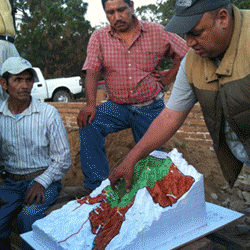
IEG found that the strategy is still relevant and in line with the overall mission of the World Bank Group, but that managing tradeoffs and exploiting synergies among the three goals of poverty reduction, conservation and economic development has proven difficult in implementation, with greater success along the environmental dimension.
-
Forests and Climate Change
The World Bank has played a major role in shaping the dialogue on the role of forests and climate change and the development of forest carbon instruments. IEG's review of the Bank managed Forest Carbon Partnership Facility found that it is providing an effective and highly inclusive platform for defining the modalities of REDD+. But it has also raised client expectations that will only be met if financial flows follow. IEG suggested the need for a high level internal dialogue about how the Bank will integrate countries' REDD strategies into overall development planning.
Protected area projects -- which constitute just under half (100 projects by count), of the total forest portfolio -- have largely been successful in setting up critical conservation areas and building their management capacity. In Brazil alone, the World Bank Group helped the Government place 24 million hectares of critical forest land under protected status. But trade-offs between conservation goals and poverty reduction aims could be better managed by ex-ante addressing customary land and resource use claims and more meaningfully incorporating community knowledge and livelihood needs into system design (access to water, transit rights, harvesting, protein, fuel and fodder and other contributions of forest resources to household security). To date, Bank Group efforts to provide local populations with sustainable alternatives to forest degradation have often proved to be ineffective or unsustained after project completion (based on a review of 32 projects that were completed by the time that the review was undertaken).
-
Payments for Environmental Services and Participatory Forest Managment
World Bank supported Payments for Environmental Services Schemes in Latin America are at the forefront of efforts to identify and place a monetary value on forest environmental services. And IFC's Biodiversity and Agricultural Commodities program has helped farmers produce and market sustainable palm oil and soy -- although it has been less successful with beef production.
The Bank's support for participatory forest management and IFC's outgrower schemes in India have been relatively successful in balancing poverty reduction with environmental aims. Two decades of sustained support for community forest management in Mexico has helped to nurture successful community based forest enterprises that are creating jobs and managing forests sustainably. The Bank's efforts to promote participatory forest management in India, Honduras, Tanzania and Albania have also yielded positive livelihood and environmental outcomes.
At the same time, neglect of the informal sector represents a missed opportunity to reach more of the forest dependent rural poor while helping to enhance the environmentally sustainable forest management. Feedback from stakeholders on the ground in Brazil, Mexico, Peru, Lao PDR, as well as interviews with IFC staff working in Nicaragua, Guatemala, Bolivia and Indonesia all pointed to the need to address inappropriate or excessive regulation of small-scale forestry activities to achieve more poverty reduction in the sector.
-
Supporting Private Sector Investment
IFC forest product sector investments have helped companies produce higher value added products, increase productivity and production capacity and have yielded relatively high rates of return. IFC has stepped up efforts at supporting sustainability along the supply chain, but the record indicates continuing challenges in achieving certification and traceability. MIGA's activities in this sector are relatively small, and are mainly focused on support for wood chipping operations. MIGA will also need to enhance its clients' reporting records on traceability.
-
Industrial Timber Concession Reforms
IEG also reviewed the performance of World Bank supported industrial timber concession reforms implemented mainly through development policy operations in tropical moist forests in Central and West Africa and East Asia. Based on an extensive review of project documentation, field visits and interviews with stakeholders on the ground, Bank own reviews, reviews of the literature and available third party assessments, IEG concluded that World Bank support for legal and regulatory reform of industrial timber concessions has improved forest governance at the national level, enhanced transparency and accountability, put environmental standards in place, and increased the capture of legal revenues in the sector. But the same body of evidence points to serious issues with implementation on the ground regarding the extent to which these concessions are being managed in an environmentally sustainable way or whether they are having positive effects on local livelihoods. These concerns have been pointed out by the World Bank's Inspection Panel with regard to past projects in Cambodia and the Democratic Republic of Congo (DRC). And more recently, World Bank project documentation has begun to point to unsustainable forest management practices (in Cameroon) and forest law enforcement challenges (in the DRC). The only World Bank Social and Poverty Assessment conducted ex-post on the effects of concession reforms (Liberia) found that food insecurity in and around the concession system was just as high as when the concessions were put in place. And when the economic returns on concessions -- and the ability to collect taxes -- are overestimated (as in DRC, Liberia and Ghana), revenues cannot be channeled as expected to benefit local communities. As Management correctly points out in its Management Response, there is a growing body of literature that is attempting to measure the profitability and sustainability of industrial logging models in tropical moist forests. The literature points to the same implementation challenges with regard to profitability, environmental sustainability, certification, and poverty reduction potential (revenue redistribution) that IEG indicates in its report. It is also relatively recent and thus deserves reflection.
This is why IEG recommended that Bank Management undertake and disclose a comprehensive review of the economic, environmental and social outcomes associated with specific World Bank support for industrial timber concession reforms in tropical moist forest countries with weak governance, including an analysis of the outcomes that could be achieved under alternative forest management schemes. While these operations are relatively few, their successful implementation will determine the fate of millions of hectares of critical intact tropical moist forest that house irreplaceable biodiversity, provide critical environmental services, and are home to millions of people that are highly dependent on forest resources. As the largest international financier for forests, the World Bank Group has a duty to weigh in on whether the forest management systems it helped put in place are meeting expectations.
In its Report to the Bank's Board of Executive Directors, the Committee on Development Effectiveness stressed that future interventions by the WBG should include rigorous assessments of expected economic, environmental, social and poverty impacts to improve implementation when engaging in timber concession reform in challenging environments. IEG looks forward to a constructive engagement with all stakeholders concerned with sustainable forest management going forward.




